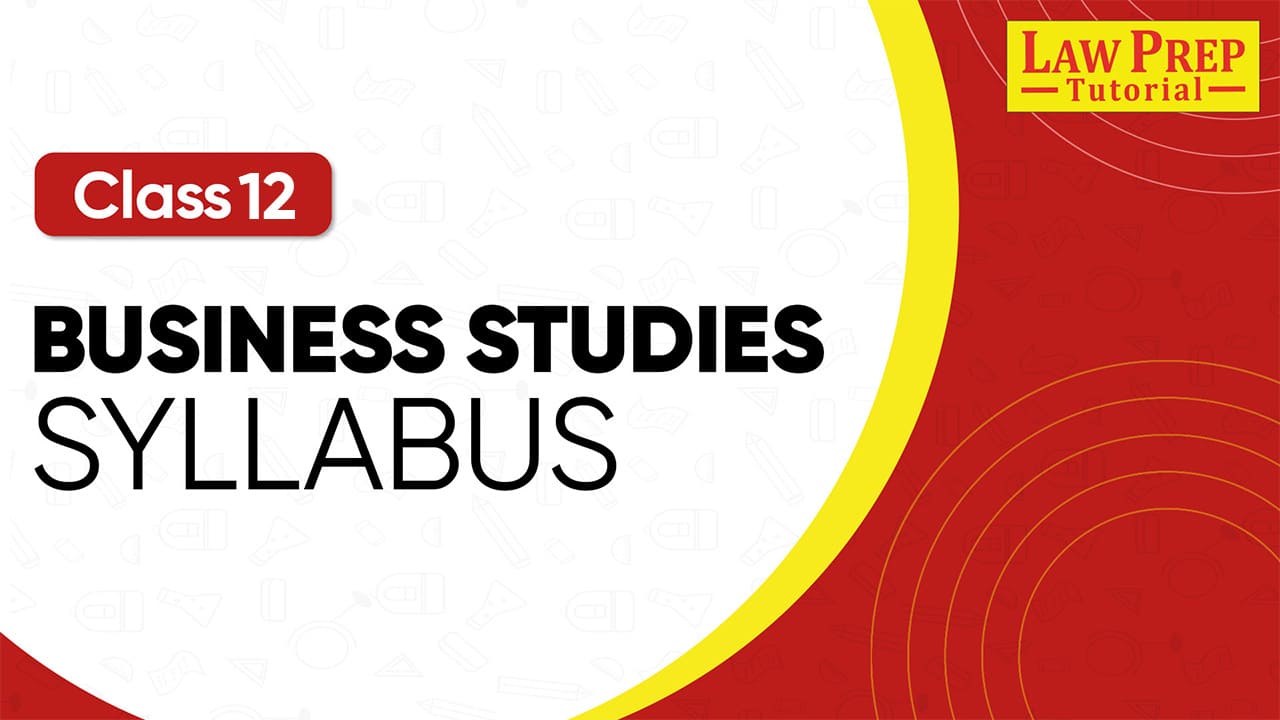Business Studies in Class 12 is a crucial subject for commerce students as it prepares you for higher education and real-world business understanding. To score well, you must have complete knowledge of the Class 12th Business Studies syllabus for the 2026-27 session.
The syllabus covers principles of management, business finance, and marketing, along with project work for practical exposure.
At Law Prep Tutorial, we provide the detailed syllabus of Class 12th Business Studies in CBSE, including unit-wise marks distribution, project guidelines, exam pattern, and prescribed books. This will help you plan your preparation effectively for board exams.
Class 12th Business Studies Syllabus 2026-27: Overview
Below is the quick overview of class 12th BST syllabus 2026-27 for CBSE and NCERT:
| Part | Units Covered | Marks |
| Part A: Principles and Functions of Management | 1. Nature and Significance of Management 2. Principles of Management 3. Business Environment 4. Planning 5. Organising 6. Staffing 7. Directing 8. Controlling | 50 |
| Part B: Business Finance and Marketing | 9. Financial Management 10. Financial Markets 11. Marketing Management 12. Consumer Protection | 30 |
| Part C: Project Work | One project based on CBSE guidelines | 20 |
| Total | — | 100 |
📥 Download Class 12 Business Studies (BST) PDF
Get the complete CBSE Class 12th Business Studies Syllabus 2026-27 PDF with unit-wise details, marks distribution, and project guidelines. Keep the syllabus handy for systematic preparation.
Class 12 Business Studies Syllabus: Part A
Part A: Principles and Functions of Management (50 Marks)
This section of the Class 12th Business Studies syllabus introduces you to the core principles of management and their practical application in business. You will study how managers plan, organise, staff, direct, and control operations.
It also highlights the importance of the business environment and principles developed by thinkers like Fayol and Taylor. By the end, you will understand how management functions help organisations achieve their goals efficiently.
This part carries the highest weightage and is essential for mastering both theoretical and application-based questions in CBSE exams.
| Unit | Topics Covered | Marks |
| 1. Nature and Significance of Management | Meaning, characteristics, objectives, importance, coordination | 16 |
| 2. Principles of Management | Fayol’s principles, Taylor’s scientific management | |
| 3. Business Environment | Meaning, importance, dimensions, impact on decisions | |
| 4. Planning | Concept, importance, limitations, steps in planning process | |
| 5. Organising | Concept, structure, delegation, decentralisation | |
| 6. Staffing | Concept, importance, recruitment, selection, training, development | |
| 7. Directing | Meaning, importance, elements – supervision, motivation, leadership, communication | |
| 8. Controlling | Concept, importance, relationship between planning & controlling, process | |
| Total | — | 50 |
Class 12 Business Studies Syllabus: Part B
Part B: Business Finance and Marketing (30 Marks)
This section of the syllabus of Class 12th Business Studies in CBSE focuses on how businesses manage money and reach customers. Financial Management and Financial Markets teach you about capital structure, stock exchange, and sources of business finance.
Marketing Management introduces the 4Ps (Product, Price, Place, Promotion) while Consumer Protection highlights consumer rights and redressal mechanisms. These topics are very practical and help students link theory with everyday business and financial activities. This part also prepares you for higher studies in management, commerce, and finance.
| Unit | Topics Covered | Marks |
| 9. Financial Management | Concept, objectives, financial decisions, factors affecting decisions | 15 |
| 10. Financial Markets | Money market, capital market, stock exchange, SEBI | |
| 11. Marketing Management | Marketing mix, functions of marketing, 4Ps in detail | |
| 12. Consumer Protection | Rights of consumers, responsibilities, redressal agencies | |
| Total | — | 30 |
More Important Resources for CBSE Exam:
| Class 11th Hornbill Syllabus | CBSE Class 11th Commerce Subjects |
| CBSE Full Form | All about CBSE Class 11th |
| Class 11th Syllabus | Class 12th Syllabus |
| Class 11th Commerce Books | CBSE Board: All details |
Class 12th Business Studies Syllabus: Part C
Part C: Project Work (20 Marks)
Project work is a compulsory and practical component of the Class 12th Business Studies syllabus. It encourages students to research real-world business cases and present their findings systematically.
Each student has to complete one project covering topics such as marketing strategies, financial planning, stock market analysis, or consumer awareness. The project develops critical thinking, research, and presentation skills. Assessment is based on the quality of the project file, knowledge of the topic, presentation skills, and viva-voce.
| Project Work Component | Marks |
| Relevance of the topic | 3 |
| Knowledge content/Research work | 6 |
| Presentation technique | 3 |
| Viva-voce | 8 |
| Total | 20 |
Tips to Prepare for Class 12 BST Syllabus 2026-27
1. Stick to NCERT Books First
The syllabus of Class 12th Business Studies in CBSE is fully covered in NCERT textbooks. Read every chapter carefully and mark important points.
2. Make Short Notes for Each Unit
Write down definitions, principles, and important headings in your own words. These notes are very useful for last-minute revision.
3. Focus on Case Studies
CBSE papers often include case-based questions. Practice examples from your textbook and sample papers to strengthen application skills.
4. Revise Important Diagrams and Flowcharts
Topics like planning process, organising steps, or communication models are easier to remember if revised with flowcharts.
5. Practice Previous Year Papers
Solving PYQs helps you understand exam trends, question patterns, and time management strategies.
6. Don’t Ignore Project Work
Project work carries 20 marks. Work sincerely on your file, keep it neat, and prepare for viva-voce to secure easy marks.
7. Revise Regularly in Small Sessions
Instead of long study hours, revise a few topics daily. This helps retain concepts like management principles and financial markets.
8. Stay Updated with Real Business News
Link your learning with real-world examples like stock exchanges, marketing strategies, or consumer rights cases. It makes answers richer and more practical.
Objectives of Class 12 BST Syllabus 2026-27
The CBSE Class 12th Business Studies syllabus is designed to give students both theoretical and practical knowledge of business operations, management, and finance. Its objectives are:
- Develop Understanding of Management: To help students learn the principles, functions, and importance of management in real business situations.
- Gain Knowledge of Business Environment: To make students aware of internal and external factors that influence business decisions.
- Learn Financial and Marketing Concepts: To understand business finance, financial markets, marketing mix, and consumer protection in detail.
- Promote Analytical and Decision-Making Skills: To prepare students to handle case studies and business-related problems logically.
- Encourage Ethical Business Practices: To highlight the role of ethics, social responsibility, and consumer rights in modern business.
- Connect Theory with Practice: To provide practical exposure through project work and real-life examples.
- Prepare for Higher Studies and Careers: To lay a strong foundation for commerce, management, and professional courses after school.
Class 12th Business Studies Exam Pattern 2026-27
| Component | Details |
| Theory Exam | 80 Marks |
| Project Work | 20 Marks |
| Total | 100 Marks |
| Duration of Theory Exam | 3 Hours |
Read the chapter-wise summaries of Class 11 English here:
CBSE Business Studies Syllabus Class 12: Question Paper Design
| Typology of Questions | Learning Outcomes Tested | Marks | Weightage |
| Remembering & Understanding | Recall of facts, concepts, and principles; demonstrating understanding of ideas | 32 | 40% |
| Applying | Applying knowledge, facts, and principles to new situations | 24 | 30% |
| Analysing, Evaluating & Creating | Breaking down concepts, solving case studies, evaluating decisions, proposing solutions | 24 | 30% |
| Total | — | 80 | 100% |
Prescribed Books for Class 12 Business Studies Syllabus
The CBSE Class 12th Business Studies syllabus is fully based on NCERT textbooks. Students should strictly follow these for preparation:
- NCERT Business Studies Part I – Principles and Functions of Management: Covers Units 1 to 8, focusing on management concepts, principles, and functions.
- NCERT Business Studies Part II – Business Finance and Marketing: Covers Units 9 to 12, focusing on finance, financial markets, marketing, and consumer protection.
Suggested Project Topics for Class 12 Business Studies Syllabus
As per CBSE guidelines, students need to complete one project in Class 12 Business Studies. The project should connect theoretical concepts with real-world applications. Here are some suggested topics:
- Study of a Stock Exchange: Functions, role of SEBI, analysis of share prices of selected companies.
- Marketing Management: Launch of a new product, designing logo, tagline, pricing strategy, and promotional plan.
- Business Environment: Impact of recent government policies (like GST, digital economy, start-up schemes) on businesses.
- Principles of Management: Application of Fayol’s or Taylor’s principles in a chosen organisation or case study.
- Consumer Protection: Study of consumer rights awareness in your locality and role of consumer forums.
- Financial Management: Capital structure, sources of finance, and financial planning of a small business.
- Comparative Study of Marketing Strategies: Between two well-known companies in the same industry (e.g., Pepsi vs Coca-Cola).
- Case Study on Multinational Companies: Growth, strategies, and challenges of an MNC operating in India.
- Analysis of Advertising: Impact of advertisements on consumer behaviour, with examples from print/digital media.
- Role of Small Businesses in India: A practical study of a local small-scale business and its challenges.
Find detailed questions and answers from all chapters of English Class 11 now:
FAQs About Class 12th Business Studies Syllabus
Theory exam is for 80 marks and project work is for 20 marks, making a total of 100.
The paper includes objective, short-answer, case-based, and long-answer questions.
Yes, NCERT textbooks Part I and II are sufficient, as they cover the entire syllabus prescribed by CBSE.
Yes, CBSE includes case-based questions to test application of concepts in real business situations.
It covers money markets, capital markets, stock exchange, and SEBI’s role.
It includes marketing mix, functions of marketing, and the 4Ps – product, price, place, and promotion.
It covers consumer rights, responsibilities, and the functioning of consumer redressal agencies.
Yes, with clear concept understanding, regular practice, and well-prepared project work, students can score full marks.
It helps students understand external factors like technology, politics, and economics that affect business decisions.
Check the latest CBSE Class 11 syllabus for all subjects below:
Explore the updated CBSE Class 12 syllabus for all subjects here:
Discover CLAT exam resources that can help you get started early:
Explore CLAT coaching centers across different cities:


